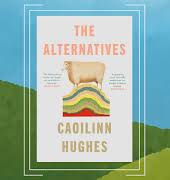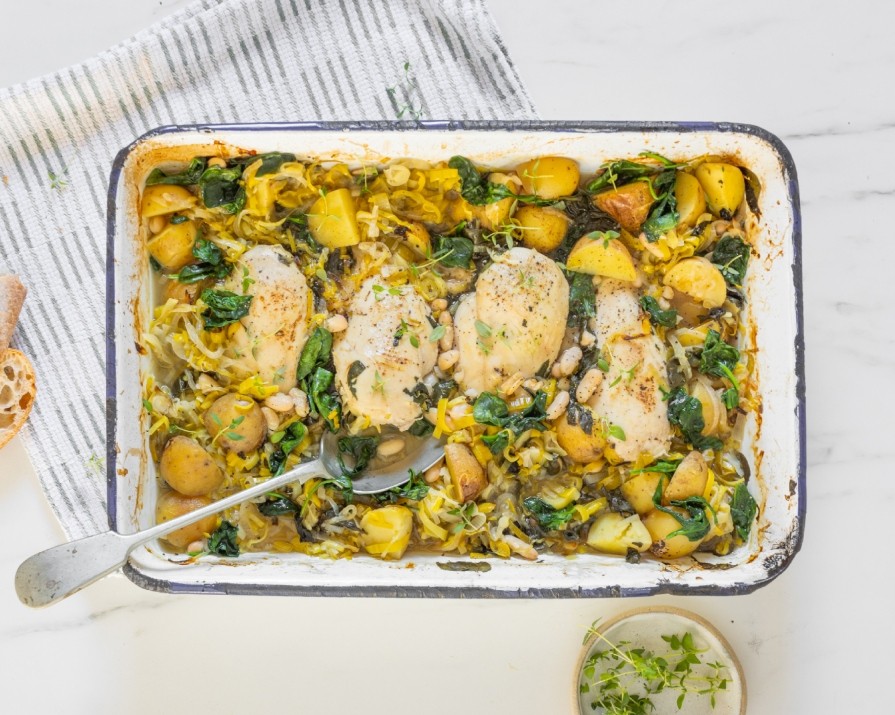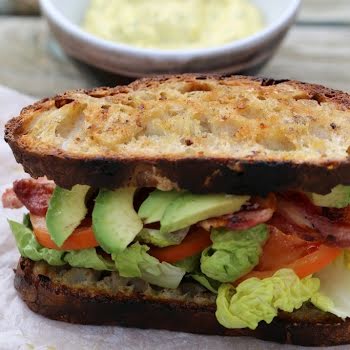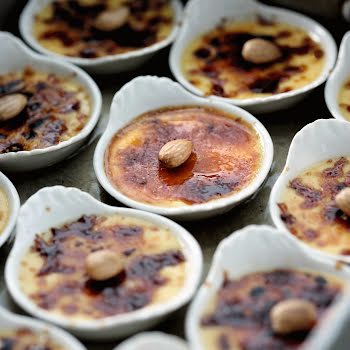By Meg Walker
21st Dec 2023
21st Dec 2023
Jess Redden shares an easy traybake recipe from her new book with us.
This traybake is so easy to make and is high in iron, folate and B vitamins to support cognitive function. Leaving the skins on the potatoes ensures that you are getting a good dose of fibre to support gut health, which is closely linked to brain health. A super-easy and delicious midweek dinner that the whole family can enjoy.
Jess Redden’s one-pot chicken and leek traybake
Serves: 4
Prep: 10 minutes
Cook: 55 minutes
Nutrients per serving
- Calories (kcal) 610
- Carbohydrates (g) 37
- Protein (g) 60
- Fat (g) 18
Ingredients
- cooking spray oil
- 4 skinless chicken breasts
- 1 tbsp olive oil
- 1 onion, sliced
- 4 cloves of garlic, peeled
- 2 leeks, sliced
- 200ml white wine
- 400ml vegetable stock
- 3 tsp dried thyme
- 600g tinned cannellini beans
- 200g baby spinach
- 400g baby potatoes, chopped into quarters
- black pepper
Method
- Preheat the oven to 200°C/180°C fan/gas mark 6. Spray a large roasting tray or casserole dish with cooking spray oil and place the chicken fillets in a single layer in the dish. Set aside.
- Add the olive oil to a large saucepan and fry the onion slices for 7-8 minutes. Add the garlic cloves and cook, stirring, for 1 minute. Add the sliced leeks and white wine and allow to bubble for 2 minutes, then add the stock.
- Turn off the heat and add the thyme, beans, spinach and potatoes. Season with a pinch of black pepper and stir until combined. Pour the stock mixture over the chicken breasts and place in the preheated oven for 40-45 minutes, or until the chicken is cooked through.
Supporting brain function through nutrition
Let’s take a look at which foods and nutrients can help to support cognitive health. Cysteine is an amino acid that has been linked to cognitive function. It is found in many protein-rich foods, both animal- and plant-based.
Here are some examples of foods that contain cysteine:
- Meat: Beef, pork, chicken, turkey and lamb are all good source of cysteine.
- Fish and seafood: Tuna, salmon and prawns are rich in cysteine.
- Eggs: The yolk in particular is a good source of cysteine.
- Dairy: Cheese, milk and yoghurt are all good sources.
- Legumes: Lentils, chickpeas and soybeans.
- Nuts and seeds: Pistachios, sunflower seeds and sesame seeds in particular.
- Whole grains: Oats, brown rice and quinoa all contain cysteine.
- Vegetables: Garlic, onions, broccoli and Brussels sprouts.
Cysteine is a precursor for the synthesis of glutathione, one of the most important antioxidants in the brain. Glutathione protects the brain from oxidative stress, which can damage brain cells and impair brain function.
Cysteine is also involved in the production of several important neurotransmitters, including dopamine, norepinephrine and serotonin. These neurotransmitters are involved in mood regulation, cognition and other important brain functions.
In addition, cysteine is involved in regulating the NMDA (N-methyl-D-aspartate) receptor, which is important for learning and memory. NMDA receptors play a key role in synaptic plasticity, the ability of the brain to change and adapt in response to experience. Overall, cysteine is an important nutrient for brain function, and its deficiency has been linked to a range of neurological disorders, including Alzheimer’s disease, Parkinson’s disease and schizophrenia. Ensuring adequate intake of cysteine-rich foods or supplements may help support healthy brain function.
Research shows that the best brain foods are the same ones that protect your heart and blood vessels. They include:
- Leafy green vegetables: Kale, spinach and broccoli are rich in vitamin K, lutein, folate and beta-carotene, nutrients found to support brain health.
- Fatty fish: This is an excellent source of omega-3 fatty acids, healthy unsaturated fats that have been linked to lower blood levels of beta-amyloid – the protein that forms damaging plaques in the brains of patients with Alzheimer’s disease. The WHO recommends eating two portions of fish per week, but be aware of the mercury content of the fish you consume. Low-mercury options include salmon, cod, pollack and tinned tuna. Plant-based sources include avocados, flaxseeds and walnuts.
- Berries: The plant pigments that give berries their gorgeous colour are called flavonoids. They have been shown to help improve memory. Berries are also full of antioxidants, which help to prevent damage to cells.
- Caffeine: Consumed in moderation, caffeine can have many positive impacts on the brain – not that I need an excuse to enjoy my morning coffee! It has been shown to increase alertness, help concentration and improve mood and memory. Caffeine stimulates the central nervous system and promotes the release of noradrenaline, dopamine and serotonin. A safe amount of caffeine to consume is 200mg per day, but be aware that it has a long half-life and your body will take hours to metabolise and eliminate it. So if you drink coffee after midday it could affect your sleep.
- Walnuts: Nuts are a good source of protein and healthy fats. While no single food group is a magical preventive treatment for cognitive decline, certain nutrients in specific foods have been found to support brain health. Walnuts are high in alpha-linolenic acid (ALA). Diets rich in omega-3 ALA and other omegas have been linked to lower blood pressure. So walnuts can benefit both the heart and brain. Generally, a diet that is good for your heart is also beneficial for your brain and mood.
- Dark chocolate: Cacao contains a good number of antioxidants as well as plant compounds called flavonoids. A specific type of flavonoid called flavanol is found in dark chocolate and it has antioxidant and anti-inflammatory properties.
Omega-3 fatty acids
The three main types of omega-3 are ALA (alpha-linolenic acid), DHA (docosahexaenoic acid) and EPA (eicosapentaenoic acid). DHA makes up most of the total fatty acids in the brain and it is concentrated in the grey matter. The grey matter contains neurons, which allow the processing of information. Grey matter also enables the control of movement, memory and emotions. These omega-3 fatty acids are found in cell membranes, which are like a protective ‘skin’ that covers cells. Oily fish is a good source of omega-3 fatty acids.
Omega-3 intake is important even before we are born, particularly during the second and third trimester of pregnancy. Research has found that mothers selectively transfer DHA to their baby during pregnancy and through breastfeeding and this supports the baby’s neurological development. Early cognitive development in foetuses requires maternal intake of omega-3 for learning and memory. Brain cells that have higher levels of omega-3 in their membranes are thought to be better able to communicate with other cells.
While the role of omega-3 fatty acids in supporting brain function is clear, their role in various mood disorders is currently being researched. There is not enough robust evidence just yet to draw conclusions, but it appears that they may be helpful in relieving symptoms of some mood disorders such as postnatal depression.
Here are some tips to bear in mind:
- Processed foods offer little to no nutritional value to the body.
- Choose lean proteins and fish.
- Choose whole grains.
- Snack on nuts and seeds.
- Increase your water intake.
- Add a tablespoon of chia seeds to your breakfast smoothies, yoghurt or porridge. Chia seeds are a source of prolonged energy, thanks to their carbohydrate content, healthy fats and filling fibre.
- Eat colourful fruits and vegetables: generally, the more vibrant and colourful the berry, the more antioxidant concentration it contains.
The foods we eat can have a significant impact on our concentration levels. Here are some ways in which different foods can affect our ability to concentrate:
- Carbohydrates are the primary source of energy for the brain, and they can help improve concentration and focus. Complex carbohydrates are digested more slowly and provide a steady supply of energy throughout the day.
- Protein is important for the production of neurotransmitters, such as dopamine and norepinephrine, which are involved in concentration and focus. Eating protein-rich foods such as fish, eggs, chicken and nuts can help improve concentration.
- Omega-3 fatty acids found in fatty fish such as salmon, as well as flaxseeds and walnuts, have been shown to improve cognitive function and concentration.
- Sugar can provide a quick burst of energy, but it can also lead to a crash in blood sugar levels and a decrease in concentration.
- Hydration is important: dehydration can lead to fatigue and poor concentration. Drinking enough water and staying hydrated throughout the day can help improve concentration levels.
Jess Redden has a degree in psychology and is a pharmacy graduate and a qualified personal trainer. She works as a pharmacist in Dublin and is passionate about taking a holistic approach to health. She shares her recipes, fitness and wellbeing tips on her Instagram page, @jessredden1 which has over 90,000 followers.

Extracted from The Food Pharmacy by Jess Redden (Gill Books), out now.























